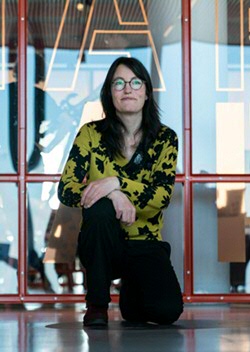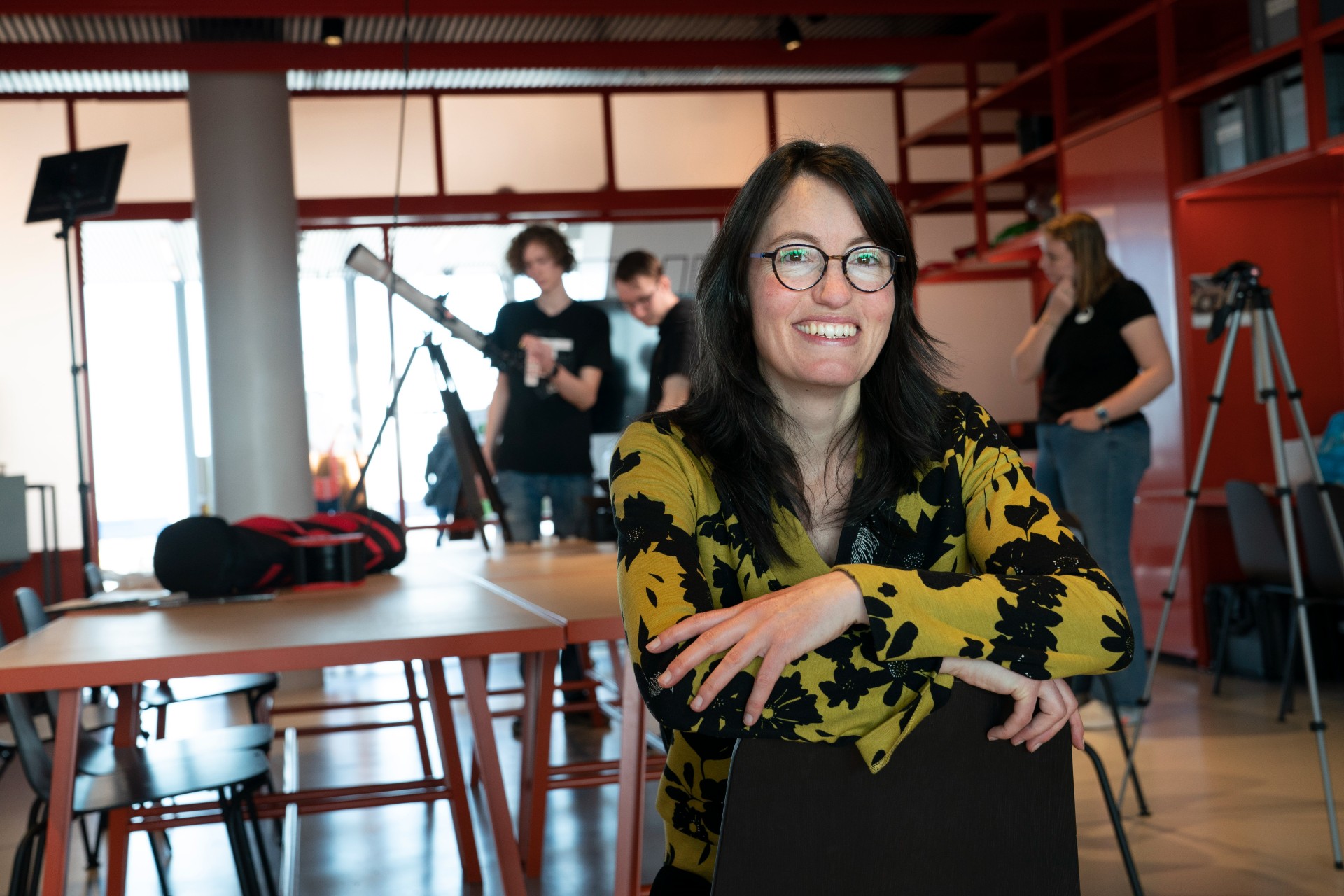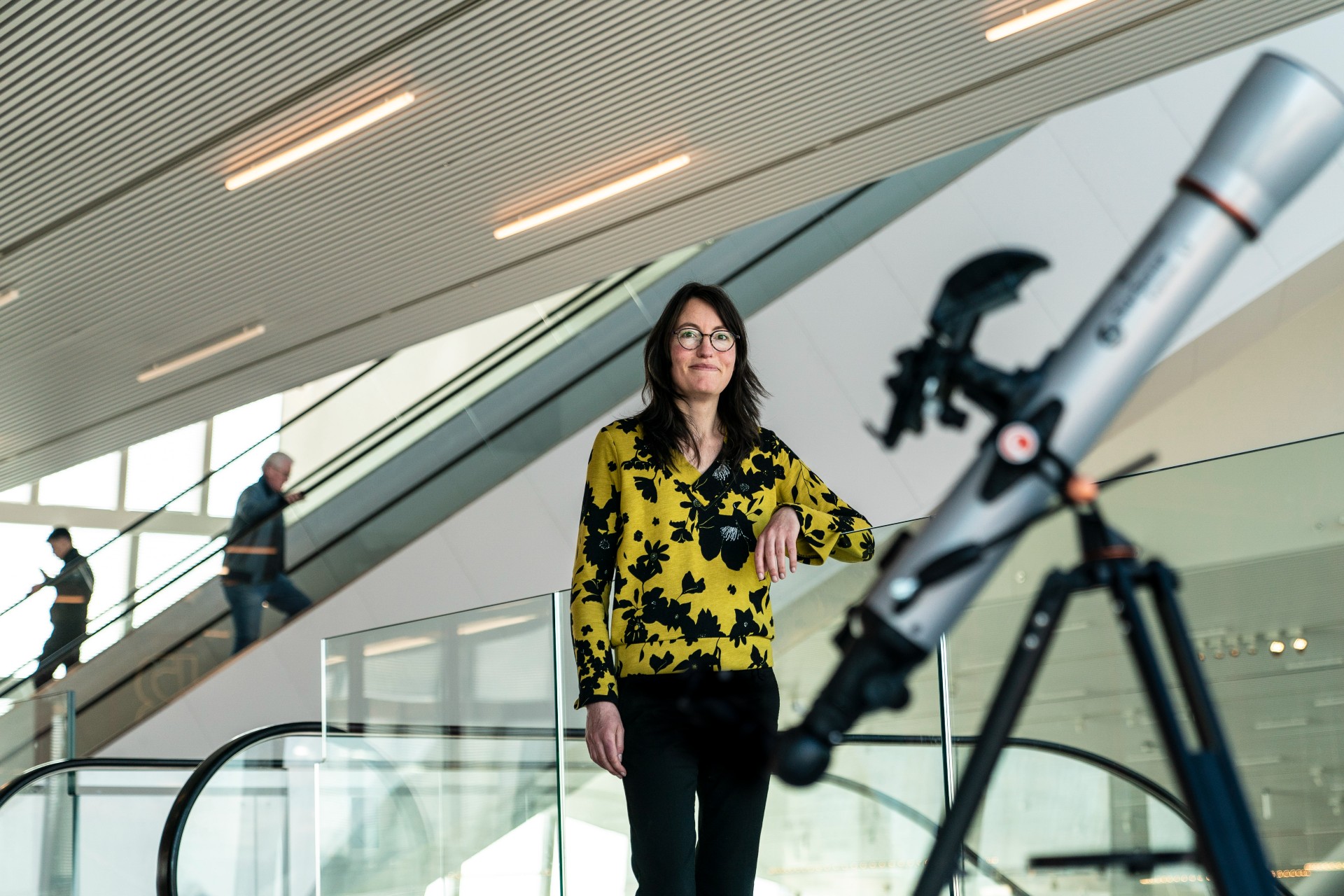CurioUs: tweerichtingsverkeer tussen burger en wetenschap

De bodem induiken om wormen te tellen, het plaatsen van een regenmeter in eigen tuin, of het lenen van een infraroodcamera om te zien op welke plekken je huis zijn warmte verliest. Bij CurioUs kun je als burger tegelijkertijd een bijdrage leveren aan wetenschappelijk onderzoek, én meer leren over je eigen leefomgeving.
Tekst: Nienke Oostra, afd. Communicatie RUG / Foto's: Reyer Boxem
CurioUs is een initiatief van Science LinX, de Aletta Jacobs School of Public Health en Forum Groningen. CurioUs organiseert mini-colleges, walk-ins en meetacties, en is de stichter van de eerste meet-o-theek van Nederland. Hier kun je een verscheidenheid aan meetinstrumenten lenen om je eigen leefomgeving in kaart te brengen. CurioUs wil door middel van deze verschillende activiteiten nieuwsgierige noorderlingen enthousiast maken om zelf aan de slag te gaan met wetenschap en techniek. Renske de Jonge, hoofd van Science LinX, vertelt wat de ambitie is van CurioUs en wat er allemaal bij dit initiatief komt kijken.
Doe-het-zelf fijnstofmeters
Tijdens de COVID-pandemie kwam het idee om wetenschap naar mensen thuis te brengen. De Jonge vertelt over de eerste meetactie die CurioUs heeft gedaan: ‘De eerste meetactie was het meten van de luchtkwaliteit in eigen leefomgeving. Mensen hadden hier zelf vragen over en met corona stond dit onderwerp ook erg in de belangstelling.’ Het plan was om de fijnstofmeters te verspreiden via bibliotheken in de regio, maar ook hier gooide de zoveelste lockdown roet in het eten: ‘We moesten de doe-het-zelf pakketjes naar mensen thuis opsturen. Door middel van een instructievideo en een hulplijn hebben deelnemers de fijnstofmeters zelf in elkaar gezet.’ 700 van deze kastjes meten tot op de dag van vandaag de luchtkwaliteit in Noord-Nederland. Sindsdien zijn er vele andere meetacties gevolgd, zoals het meten van de regen en de nationale wormentelling.

Nieuwsgierige noorderlingen
De Jonge geeft aan dat er veel interesse is voor de meetacties, bijvoorbeeld omdat mensen zich zorgen maken over hun eigen leefomgeving, nieuwsgierig zijn, wetenschap(pers) willen helpen of het gewoonweg leuk vinden om mee te doen. ‘Inmiddels beginnen we een community op te bouwen van nieuwsgierige noorderlingen. We trekken een breed publiek, jong en oud doet mee’, aldus De Jonge. CurioUs is bedoeld om mensen te laten zien dat je geen groot lab of dure apparatuur nodig hebt om meer te weten te komen over je eigen leefomgeving. Zo kan de burger zijn eigen omgeving gezonder maken, stelt De Jonge. ‘Als je niet weet hoe het gesteld is met je omgeving, ga je er ook minder snel voor zorgen. Door technologie toegankelijker te maken, kunnen we mensen betrekken bij het proces en de uitkomst van onderzoek.’
Meet-o-theek
Waar het Forum voornamelijk de fysieke plek is waar de meet-o-theek gehuisvest is en de publieksactiviteiten plaatsvinden, zijn de Aletta Jacobs School of Public Health en Science LinX meer gericht op de wetenschap. ‘Het verschilt per thema wie welke rol heeft. Science LinX zit meer op het gebied van science en engineering, waar de Aletta School meer gericht is op publieke gezondheid.’ Science LinX beheert daarnaast samen met student-assistenten de meet-o-theek in het Forum, waar burgers allerlei meetapparaten kunnen lenen. De Jonge geeft aan dat op dit moment alle apparaten die te maken hebben met energie erg populair zijn. Zo zijn de infraroodcamera’s afgelopen winter constant gereserveerd geweest en ook de slimme stekkers zijn erg in trek. Op dit moment zijn het voornamelijk Stadjers die de meetapparatuur gebruiken, gezien de locatie van de meet-o-theek. De Jonge vertelt dat er al plannen zijn om de uitleenplekken uit te breiden, om het ook voor de bredere regio toegankelijker te maken.

Trial and error
Omdat CurioUs de meetacties zo behapbaar en laagdrempelig mogelijk wil houden voor de deelnemers, is het kiezen van een passend onderzoek nog best een uitdaging. ‘Je wilt niet dat mensen een hele cursus moeten volgen voordat ze mee kunnen doen, maar je wilt wel dat je data bruikbaar is. Het zijn vaak mooie onderwerpen, maar deze in een goede meetactie gieten kent vele haken en ogen’, weet De Jonge. Zo had de meetactie van kruisspinnen veel aanmeldingen, maar vonden mensen het lastig om de spinnen te vinden en goed op de foto te krijgen. De Jonge geeft aan dat de pilotfase nu wel tot een einde loopt: ‘De afgelopen tijd hebben we veel geprobeerd om te kijken wat werkt en wat niet, een methode van trial-and-error. Nu gaan we een nieuwe fase in, waarin we op een meer gestandaardiseerde wijze te werk kunnen gaan.’
Tweerichtingsverkeer
Naast een verdere uitrol in de regio hoopt CurioUs het tweerichtingsverkeer tussen burgers en de wetenschap nog verder te versterken. ‘Nu ligt het initiatief voor meetacties voornamelijk bij de wetenschapper, het zou mooi zijn als mensen zelf vragen gaan stellen en suggesties hebben voor verder onderzoek’, aldus De Jonge. Omdat de meetacties onderdeel zijn van wetenschappelijk onderzoek laten de resultaten veelal nog even op zich wachten. Wanneer deze beschikbaar worden en burgers feedback krijgen op hun eigen metingen, kan dit het tweerichtingsverkeer verder versterken.
Meer informatie
Meer nieuws
-
17 februari 2026
De lange zoektocht naar nieuwe fysica
-
10 februari 2026
Waarom slechts een klein aantal planeten geschikt is voor leven
